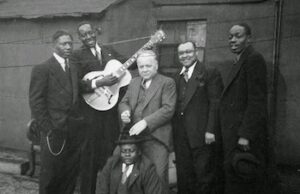
Lester Melrose (center)
*Lester Melrose was born on this date in 1891. He was a white-American talent scout and producer of Chicago blues music.
Lester Franklin Melrose was born in Sumner, Illinois, the second of six children of Frank and Mollie Melrose, who owned a small farm. He relocated to Chicago around 1914 and tried unsuccessfully as a catcher for the Chicago White Sox baseball team before starting work as a grocery salesman. In 1918, Melrose, his elder brother Walter and Marty Bloom formed the Melrose Brothers Music Company, on the South Side of Chicago. In May 1923, he met Jelly Roll Morton at the store, and Morton became the company's chief songwriter and arranger.
By the end of 1923, Walter Melrose moved the music publishing business downtown, while Lester continued to operate the music store with a new partner. In 1925, Melrose sold his share of the store and became a freelance A&R man, combining the roles of talent scout and record producer. He started promoting many popular blues artists, recording them mainly in Chicago. Melrose worked for several record labels simultaneously in the 1930s. Among the artists he recorded and brought to the world's attention were Joe "King" Oliver, Big Bill Broonzy, Sonny Boy Williamson, Memphis Minnie, Roosevelt Sykes, Lonnie Johnson, Big Joe Williams, Bukka White, Washboard Sam, Champion Jack Dupree, Jazz Gillum, Arthur Crudup, Victoria Spivey, and Leroy Carr.
Melrose enjoyed Chicago blues, although he favored acoustic over electric performances. His chief contribution was establishing a sound with full band arrangements, ensemble playing, and a rhythm section, which appealed to the increasingly urbanized black record-buying audience and prefigured the electric blues and R&B of the late 1940s and the small group sound that became dominant in rock and roll. The Melrose sound dominated Chicago blues before World War II. Still, the arrival of large numbers of Southern African Americans in Chicago during and after the war brought Melrose's dominance to an end as a harder, deeper blues sound proved more popular with the new audience. However, Melrose continued to work into the 1950s.
He then retired to Lake, Florida, and died there on April 12, 1968. Although he could not play or sing a note of music, he owned the copyright to over three thousand songs, mostly blues. As was the widespread custom at the time (and not just in blues music), Melrose often assigned composer credit and performance rights of the artists' songs to himself, paying the artists only for the recording session. Lester Melrose is a member of the Blues Hall of Fame.